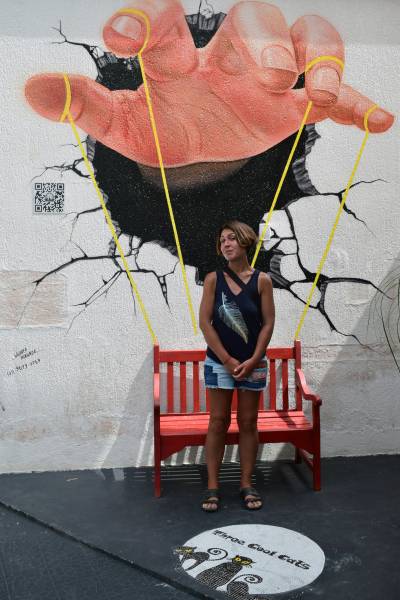Juliette is a French expat living in Ottawa, Canada. Moving alone, she started teaching French as a second language and has now made a name for herself in freelance work. She still can’t stand the winters though.
A keen photographer and traveller, you can catch up with her adventures on her website correresmidestino.com.

About Juliette
Q: Where are you originally from?
A: I was born and raised in France.
Q: Where are you living now?
A: I live in Ottawa, Canada.
Q: When did you move to Canada?
A: I first came in 2002, then went back and forth between France and Canada before getting permanent resident status in 2005. I became a Canadian citizen in 2009.
Q: Did you move to Canada alone or with a spouse/family?
A: I moved alone.
Q: Why did you move; what do you do?
A: I didn’t need a reason to move; I just thought, “Why not?”! I was in my early twenties, and I didn’t have a career plan – or a plan, period. I took a chance on Canada, mostly because it was a country open to new immigrants and I spoke one of the two official languages.
I taught French as a second language for a few years, and then I worked as a translator for the federal government. In 2012, I decided to go freelance, and I’ve been offering translation, editing and copywriting services to various clients from the public and private sectors since then.
About Ottawa
Q: What do you enjoy most about the city? How would you rate the quality of life compared to your home country?
A: Overall, Ottawa is an easy city to live in. It’s safe, clean, family-friendly, and it’s arguably one of the most picturesque cities in Canada. I can’t compare it to France; it’s just different. I do think the job market is better here than in Europe, though, especially if you’re bilingual.
Q: Any negatives? What do you miss most about home?
A: I can’t stand winter. You’d think I’d be used to it by now… well, I am, but I still hate it. It’s brutal. It makes life complicated – commuting, wearing layers of clothing, etc. And this season is so long! I miss a true European spring!
People tend to ask me if I miss French food. Honestly, not so much. I enjoy it when I’m in France, but I eat differently in Canada; I focus more on world food.
Q: What are the biggest adjustments you had to make when settling into expat life in Canada? Did you experience any particular elements of culture shock?
A: I adapted fairly easily, mostly because I had extensive travel experience (including in more “exotic” countries like China) and because I was a naïve twentysomething. I had just graduated from university, and I took my first steps into adulthood in Canada.
Interestingly, I did experience a certain level of culture shock ten years later when our son was born. Neither my husband nor I grew up in Canada, and being a parent in a third culture isn’t easy. What’s “common sense” for a French mother and a Chinese father isn’t for Canadian parents, and vice versa. Childcare, the school system and parenting in general are very cultural.
Q: How would you rate the healthcare in Canada? Have you had any particularly good/bad experiences with regard to doctors and hospitals? Are there any hospitals you would recommend?
A: I have a love-and-hate relationship with the Canadian healthcare system.
On one hand, I’m grateful for the single-payer healthcare system where most of my needs are covered by OHIP, the provincial insurance plan. For instance, I didn’t pay a cent out of pocket for pre- and post-natal care when I had my son. Generally speaking, I trust the system, and the quality of care is good.
However, we don’t have enough general practitioners, and the walk-in clinic system is awful. It’s hard to get a prescription for antibiotics (sometimes, you do need them!), and it’s hard to be listened to as a patient.
Q: How would you rate the public transport? What are the different options? Do you need to own a car?
A: Considering extreme weather conditions and distances, I’d say you do need a car, especially if you have young kids. Public transit is slow, expensive and unreliable once you’re out of the city centre.
About living in Ottawa
Q: What’s the cost of living compared to home? What is cheap or expensive in particular?
A: I do find Canada a bit cheaper than France, but expats often argue about this, and there is no perfect answer – it depends on your way of life. Generally speaking, wine, dairy products, telco (phone, cable, Internet) and public transit are more expensive than in France. Housing, clothing, and utilities are cheaper.
Q: How do you rate the standard of housing in Ottawa? What different options are available for expats?
A: Vancouver and Toronto are the most expensive cities for housing, followed by Montreal and Ottawa. There are many options available – we have enough land! – but it depends on your budget and way of life.
Q: What are the biggest safety issues facing expats living in Canada? Are there any areas expats should avoid?
A: Canada is very safe by world standards, and expats are unlikely to be targeted negatively.
Q: Any areas/suburbs you’d recommend for expats to live in?
A: There is no “expat community” per se in Canada.
Meeting people and making friends
Q: How tolerant are the locals of foreigners? Is there any obvious discrimination against particular religions or women, etc.?
A: Canadians are well-travelled and open-minded, and any kind of discrimination is strongly frowned upon. I love how diverse and accepting our society is.
Q: Was it easy meeting people and making friends? How did you go about meeting new people?
A: I met most of my existing social circle at work before I opted for a freelancing career.
Q: Have you made friends with locals, or do you mix mainly with other expats? What advice would you give to new expats looking to make friends? Any social/expat groups you can recommend?
A: I live in the English part of Canada, and most French move to Montreal. There isn’t a huge French community in Ontario. I never really looked for other expats… I don’t consider myself an expat; I’m an immigrant, and I have zero interest in chatting about the “good old days in France.”
That said, most of my friends have an international background, and I do know quite a few francophones (from France or other French-speaking countries) through my job as a translator.
About working in Canada
Q: Did you have a problem getting a visa or work permit? Did you tackle the visa process yourself, or did you enlist the services of an immigration consultant?
A: I handled the immigration process alone. Canada wasn’t as popular as it is today back then, and the process was straightforward and transparent. I was lucky.
Q: What’s the economic climate like in Ottawa? Do you have any tips for expats looking to find a job there? Which resources did you find most useful?
A: The federal government is the biggest employer in Ottawa, and it’s notoriously hard to land a permanent position, especially as a permanent resident or with a work visa (Canadian citizens have priority). That said, there are many work opportunities with the government for consultants, scientists, etc.
Q: How does the work culture differ from home? Do you have any tips for expats doing business in Canada?
A: Canada is between the US and Europe when it comes to labour laws. It offers better employment protection than in the US (mandatory paid vacation time, maternity leave, unemployment insurance, etc.), but it’s not as generous as in many European countries.
And finally…
Q: Is there any other advice you would like to offer new expat arrivals?
A: The positive sides of Canada will depend on your expectations. Overall, I find Canada is an easy country to live in. People are nice, it’s a very steady place, pretty safe by world standards, and we are a good mix of American and European cultures.
~ Interviewed June 2017



